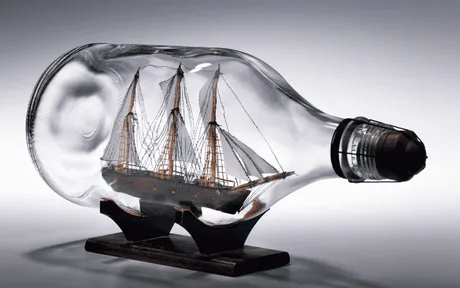
Bottlenecks are one of those universal problems that pops up across multiple sectors (most of all logistics/production). Not so long ago the economy experienced a bottleneck in silicone, which in turn produced a bottleneck in chips and circuits, which in turn produced a bottleneck in new cars, which then produced a bottleneck of used cars. The domino effect is real. The price of all these things skyrocketed from low supply and stable demand (not "inflation").
Most of us take these logistics for granted because they are normally quite efficient; a well oiled machine. After all, there are trillions of dollars on the line to be made when it comes to finance and the economy. Hard to capture that value unless one stays competitive in the market, offering the most value for the cheapest price. Capitalism: No one pays attention when everything works. No one knows what a sub-prime loan is until the 2008 housing crisis.
So what's going on in Factorio?
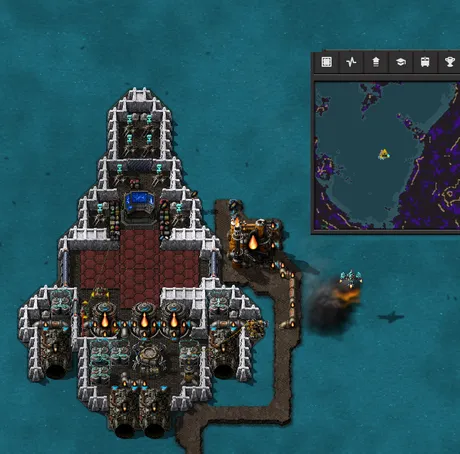
How did this happen?
Ah well... damn bottlenecks I tell ya!
Four kinds of Factorio Bottlenecks:
There are more.
- Trying to put too much product on a belt. This clogs the belt and the assemblers creating the items.
- Trying to take too much product off a belt. This leaves other assemblers down the line high and dry.
- Having a poor ratio of resources. Not having enough of a critical resource can bog everything down.
- Having too much surplus. If assemblers are logged with items they shut down.
Alright so what happened here...
Debugging a Factorio base is a lot like debugging an actual program. If there is no error-checking going on in the middle of a program, the only time we notice an error is at an endpoint. This is why robust error checking has a lot of value in both software development and playing this game.
The ultimate endpoint:
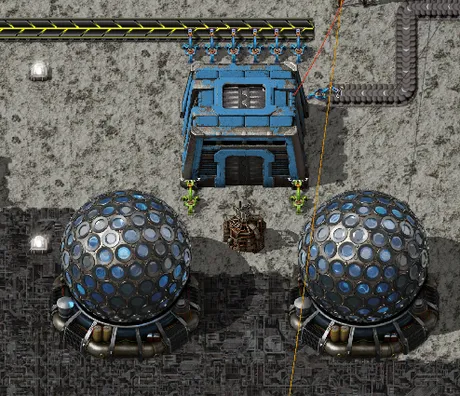
These are my science labs.
Whenever I want to "level up" and research a new technology, these buildings consume research packs in order to do it. If I start a research project and the progress bar gets stuck at a certain percentage, I know something has gone wrong. Somewhere along all my many lines of 'code', there is a bottle-neck or a critical failure that's messing everything up and slowing it down.
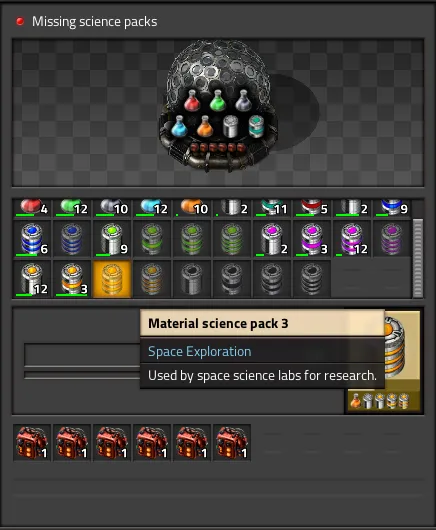
So I click on my science lab and see that I'm missing material science pack 3. Now I have to go check where I make that product.
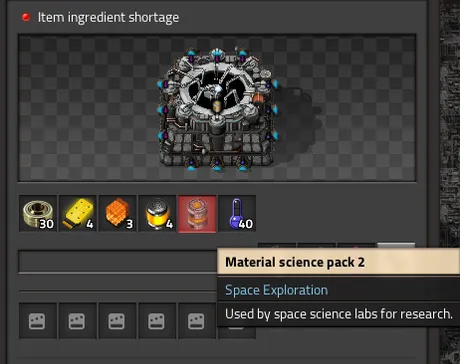
So I find the building that creates level 3 science packs... lo and behold that this assembler is missing level 2 science packs... Now I have to keep following the path to find out what went wrong.
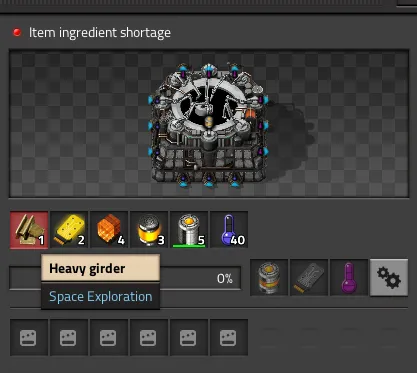
Alright so I have level 1 packs ready to go... but I'm short on Heavy girders... onto the assembler that creates that product.
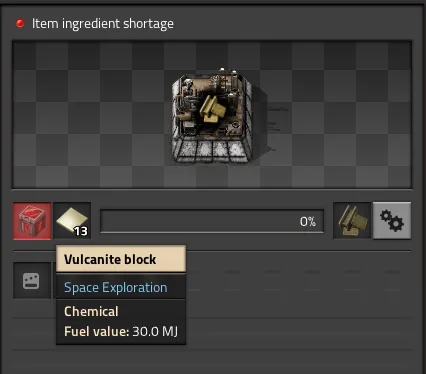
Ah... damn!
Finally found the real problem.
It's important to note again that this process is exactly like debugging a real program. If I had set up a preemptive alert on Vulcanite like I should have in the first place, I wouldn't of had to traverse the path of broken code to find this little bug. Instead I was lazy and allowed the problem to present itself as an endpoint bottleneck. Thus, it ended up taking me ten times as long to figure out the source of the problem.
Low on VULCANITE. Shit shit shit. Here we see one of the shortcuts I took legit hundreds of hours ago coming to bite me in the ass. When I first got into space, Vulcanite was one of the very first resources I needed to make progress. However, rather than set up shop on a planet whose core was vulcanite and set up a robust outpost that would never run out of resources... I opted to take a shortcut.
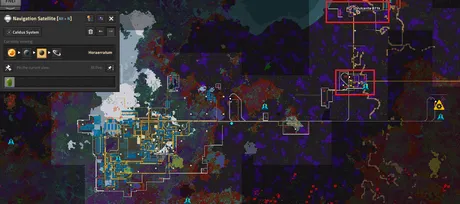
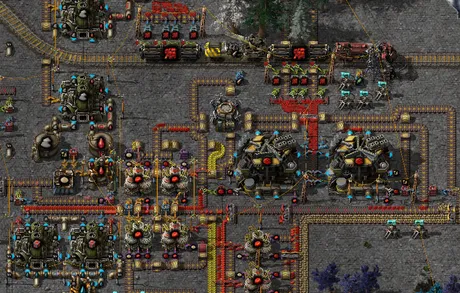
Instead of opting for the robust solution I colonized this planet first. The core was NOT made of Vulcanite or Cryonite, which were the new resources I needed to begin the mid-game, but there were patches of both those resources here. I figured instead of having to create a base on two or three planets I could just create a starter base here to get me jump-started. However, I've already mined out all the cryonite on the entire planet, and vulcanite is just trickling in and not enough for my massive space station.
If I had it to do all over again? I'd probably still do the same thing. Only in retrospect do I regret making the decision because now I need to build a more scaled up solution. However, if I had tried to build the scaled up solution right at the beginning it would have taken exponentially longer to get done, and I wouldn't have even found the planet that I just recently decided to build on. The best solution presented itself right when I needed it.
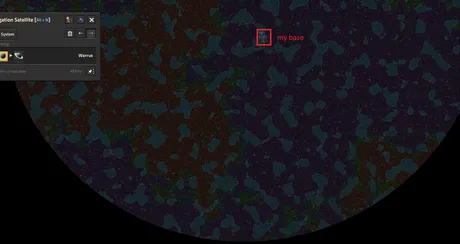
And so I found this huge planet: Warrus. With a radius of 8447 units, it was even bigger than Nauvis' 5692. Planets are bigger than moons (obviously), and the bigger the planet the more yield it gets on core mining. I knew that if I had set up shop here I would only need one core miner and limited infrastructure and that would last me until the end of the game. Up until this point I had only built on moons, because there are a lot more of them and the planets in my area don't have the resources I need.
As I was looking for the perfect spot to build (access to water, oil, core mining, and beryllium for icing on the cake) I found it. It was the perfect spot. I was looking right at it, and I confirmed the landing on my spaceship. The problem? I was looking at the actual map instead of satellite navigation. My ship was still primed to land in the middle of water. And that is how I crashed my car into a fucking lake.
Once that happened I had to scramble pretty hard.
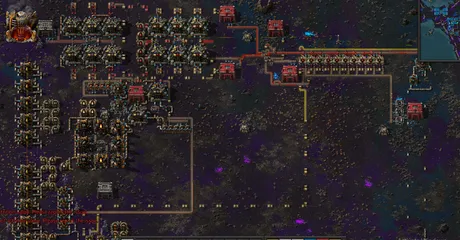
Ah, I had such grand plans for this base. I was going to polish up some blueprints and make it so any further colonies would be super easy. I was going to make it look clean and polished... instead it became the same experimental clusterfuck as all my other solutions. Very sad, although I did learn some things. Business as usual. Expectations: meet reality. But also off-topic.
Bottlenecks can come in many forms.
Right now Europe, and especially Germany, are in the middle of an insane energy crisis. I read an article the other day about a smelting plant going out of business because it was no long financially viable due to the rising costs of energy. California is in the middle of a crisis as well, and everyone is making fun of them for pushing electric cars and then telling people not to charge them.
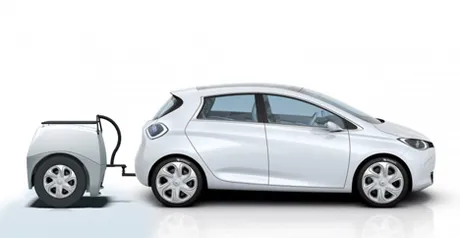
An electric car towing a gas-powered generator... seriously.
Brilliant guys. Truly awe-inspiring.
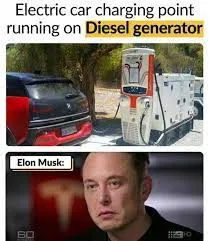
Truly, this is what happens when we allow politicians to come in and 'fix' things. They look at something like Bitcoin energy consumption and call it the problem. Like no, you are the problem. Poor distribution of wealth and power is the problem. Crypto is the solution. But talk is cheap, and we need to prove it.
Conclusion
With everything going on the world today, we need to take a good hard look at logistics and how things can go wrong. Within a massive world economy, even the supply of something like gas or electricity going down ten or fifteen percent can easily double the price. That's because essential goods are essential, and some people are forced to pay the cost no matter what it is because their business or livelihood depends on it. If rising prices don't shake off any dead weight, the price will just keep going up until it does.
@taskmaster4450 has already been reporting the stockpile of product stacking up at retail outlets like Walmart and Target. There will be a deflationary snapback. The dollar will increase in purchasing power, and ironically that will probably be worse for the economy than 'inflation'. Hopefully crypto can weather the storm but by all accounts it looks like we are in for one or two years of pain.
6400
Posted Using LeoFinance Beta
Return from Hyperfocus Part 4: Bottlenecks to edicted's Web3 Blog
